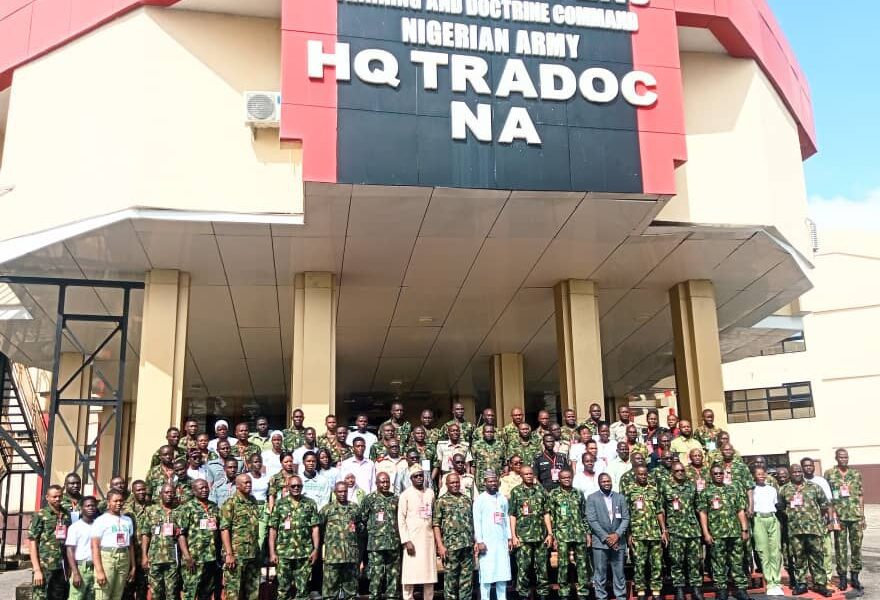**Says, the youth can play positive role in sustainable peace
The Nigeria Coalition on Youth Peace and Security has marked the 8th Anniversary of the United Nations Security Council Resolution (UNSCR 2250) on Youth Peace and Security on the 9th December, 2023
In a statement that was jointly signed by the Co-Chairs of the Coalition namely Amina Dauran, Theophilus Ekpon and Maryam Ibrahim Sani indicated it comemorated the 8th anniverssary with the support from the Federal Ministry of Youth Development also the United Nations Population Fund.
According to the statement, the UN Security Council Resolution 2250 (UNSCR2250) was passed after more than 10,000 young people called for it in the Amman Youth Declaration, adopted during the Global Forum on Youth, Peace and Security in August 2015.
“The Resolution marked the birth of a Youth, Peace and Security agenda and was very much inspired by the UN Security Council Resolution 1325 on Women, Peace and Security.

“The UNSCR 2250 on Youth Peace and Security (YPS) was unanimously adopted by the United Nations Security Council (UNSC) on 9th December, 2015 under the leadership of the Hashemite Kingdom of Jordan, and hence the anniversary of the UNSCR 2250 is commemorated on this day globally.”
According to the statement, the adoption of the UNSCR2250 marked the culmination of years of advocacy by civil society for the recognition by the Security Council that young men and young women have a critical and positive role to play for building sustainable peace.
“Its passage would not have been achieved without the leadership of the Hashemite Kingdom of Jordan, who sponsored the resolution, hosted the Global Forum in Amman and led an Open Debate in the Security Council in April 2015.
“This resolution is the first to be fully dedicated to recognizing the important and positive role young women and men play in the maintenance and promotion of international peace and security.
“It recognizes that the energy and creativity of young people should be harnessed and actively engaged in shaping lasting peace and contributing to justice and reconciliation, and that a large youth population presents a demographic dividend that can contribute to lasting peace and economic prosperity if inclusive policies are in place.
“UNSCR 2250 acknowledges that the growth of violent extremism, especially amongst young women and men, threatens stability and development, and can often derail peacebuilding efforts, and foment conflict.
The remaining part of the statement reads,
“The Resolution stresses the importance of addressing the conditions and factors leading to the rise of violent radicalization and extremism amongst youth. It also notes the important role young women and men can play as positive role models in preventing and countering violent extremism.
“A reference to the Secretary General’s Plan of Action to Prevent Violent Extremism to integrate youth’s participation, leadership and empowerment as core to the United Nation’s strategy and responses, is included.
Security Council Resolution 2250 specifically identifies five main pillars for action:
Participation: calling on Member States to involve young people in conflict prevention and resolution, in violence prevention and in the promotion of social cohesion. “Member States are urged to consider ways to increase representation of youth in decision making at all levels.
Protection: recalling the obligations to protect civilians, including young people, during armed conflict and in post conflict times, and in particular from all forms of sexual and gender based violence.
“Prevention: urging the facilitation of enabling environments, investments in socio-economic development and quality education for young women and young men, and the creation of mechanisms to promote a culture of peace, tolerance, intercultural and interreligious dialogue that involve youth.
“Partnership: highlighting the need to increase political, financial, technical and logistical support for the work with young peacebuilders by relevant UN entities as well as regional and international organizations.
“It also highlights the importance of partnering with youth, local communities and non-governmental actors in countering violence extremism.
“Disengagement and reintegration: for young women and men directly involved in armed conflict, including through youth employment opportunities, inclusive labour policies, national youth employment action plans in partnership with the private sector, relevant education opportunities, and support for youth-led and peacebuilding organizations as partners in youth employment and entrepreneurship programs.
“In response to the unanimous adoption of the UNSCR 2250 on Youth Peace and Security, Nigeria developed and launched a National Action Plan (NAP) on Youth, Peace and Security (YPS) that is anchored on the five pillars of the UNSCR 2250 on YPS on November 1, 2021. Working with Civil Society and Youth groups, we have also established the Nigeria Coalition on Youth, Peace and Security (NCYPS) that is co-Chaired by the Federal Ministry of Youth Development, the Centre for Sustainable Development and Education in Africa, and the Youth Wing of the Police Community Relations Committee. “The NCYPS through its co-Chairs and Steering Committee is leading the implementation of the NAPYPS in Nigeria.
In a bid to localize UNSCR 2250 in Nigeria, the Federal Ministry for Youth and Sports Development (FMYSD) in partnership with the Centre for Sustainable Development and Education in Africa (CSDEA), and the Institute for Peace and Conflict Resolution (IPCR) – Federal Ministry of Foreign Affairs launched the UNSCR 2250 in Abuja in October, 2016 to bring attention to the issues of Youth, Peace and Security (YPS) – marking a renewed focus on the YPS agenda in Nigeria. An outcome of the launch was the establishment of a National Working Group on Youth and Peacebuilding which later became the Nigeria Coalition on Youth, Peace and Security, when the Interagency Working Group on Youth and Peacebuilding metamorphosed into the Global Coalition on Youth, Peace and Security.
Another outcome of the launch of the UNSCR 2250 in Nigeria and the subsequent 2017 National Consultative Conference on Youth, Peace and Security was the call by stakeholders to develop a NAPYPS. The process to develop a NAPYPS in Nigeria was robust including over a dozen of in-person consultations with young people and other stakeholders in the form of national conferences, zonal workshops, national validation meetings, and community level focus group discussions to bring together youth groups, civil society, government, security agencies, the media, traditional and religious institutions from communities across the 36 states of the federation and the Federal Capital Territory. Inputs were also received through over one dozen online consultations and meetings. Several youth and civil society organizations as well as the AU through its Youth for Peace (Africa) Program sent in written inputs. Notably, these consultations were preceded by a desk review, development of structured instruments, pre-test and validation of the instruments before use. Thereafter, the NAPYPS was subjected to an affirmation meeting on the 27th of August, 2021 before its official launch on November 1st, 2021 by the Honorable Ministers of Youth and Sports Development, and Women Affairs.
“The Youth, Peace and Security agenda in Nigeria has the Nigeria Coalition on Youth, Peace and Security, its co-Chairs, the Steering Committee with the support of the Federal Ministry of Youth and Sports Development leading its implementation.
“There are also State Coalitions on Youth Peace and Security across Nigeria and especially in pilot states that are also led by three co-Chairs and a Steering Committee.
“The NAPYPS (2021 – 2024) which was developed to reflect and build upon the five pillars of the UNSCR 2250 is now in its pilot phase of implementation in Adamawa, Anambra, Delta, Kaduna, Oyo and Plateau states, and the Federal Capital Territory. “These states have been chosen as pilots to measure impact and collect data that will guide scaling full implementation to other states. It is also noteworthy to mention that NAPYPS implementation is also on-going in non-pilot states that were able to mobilize additional resources. These states include Katsina, Kano, Nasarawa and Kogi. Both Kogi and Nasarawa states have recently launched their State Action Plans on YPS.
“Earlier this year, the Nigeria Coalition on YPS and the Federal Ministry of Youth Development released its one year impact report of the implementation of the NAPYPS and the Youth Peace and Security Agenda as part of the commitment of stakeholders to periodic reviews.
“The report highlighted progress in ensuring effective communication among stakeholders, building on existing structures at both national and state levels, peer exchange, knowledge sharing, advocacy, capacity development, state frameworks on YPS, and the onset of specific government budgets for YPS.
“The impact report also pointed out that inadequate funding, bureaucracy, limited capacity on YPS among stakeholders, lack of safe spaces for civil society and youth groups are some of the challenges militating against the implementation of the NAPYPS and the YPS Agenda in Nigeria.
“We are hopeful that the implementation of the NAPYPS and the YPS Agenda will open positive and sustainable opportunities for young people, including the spaces to express their talents and contribute to lasting peace and development of our great nation, Nigeria.
“We call on all Nigerian citizens and our international partners to support us in this bold step to giving opportunities to the youth to express their talents and creativities leading to lasting peace and development for our great nation, Nigeria.



